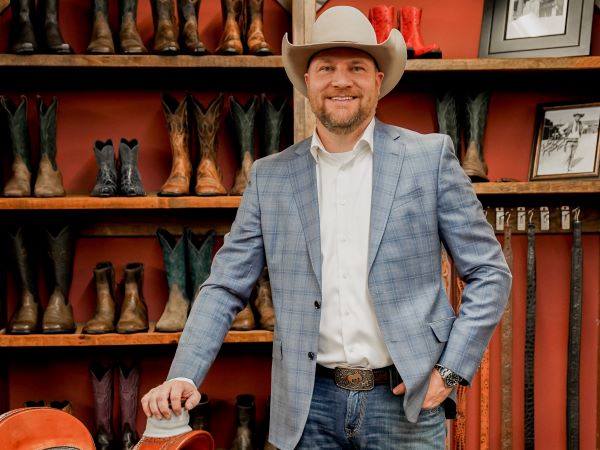4 tips for sustaining companies long-term

The spirit of the West is an attitude, a mindset that change can bring about a better life. That belief propels Braydan Shaw (pictured below), president of Burns 1876, the oldest same-family-owned western retail business in the world. A sixth-generation owner of the company, Shaw holds firm that the Western spirit is what led his company to launch in 1876 and why long-term business success continues to thrive 146 years later.

Hear Braydan tell his story: A Life of Climb Podcast
“Our family has always been very entrepreneurial, willing to move and adjust as things change and always seeking to do better,” Shaw says. “That’s really how we got our start.”
That start begins in the 1600s when George Miller fled England amid religious persecution and settled in what is now Maine. Over the next several centuries, the family migrated west, seeking new opportunities.
The family made it past the Great Plains by the time Miles Lamonie Burns, Shaw’s descendant, opened up his retail shop near Torrey, Utah, more than 200 miles south of Salt Lake City and 20 years before Utah officially became a state.
The Burns story — from then until now — demonstrates four key tips that are critical for any business interested in sustaining long-term business success and growth.
1. Be flexible enough to pivot when necessary
When Burns started out, it sold high-quality harnesses for horses. Over time the company expanded its offerings, from pack bags designed for workhorses and sold to the federal government in the early 20th century to saddles as horse riding became more popular.
The advent of the automobile could have crippled a harness and blacksmith company like Burns, but operating with the mindset that change could bring on a better life, the company pivoted.
Shaw’s great-grandfather invented the Pik Pocket, a collapsible storage pouch that went behind a truck driver’s seat, and Shaw’s grandmother developed blanket-styled covers to go over a truck’s hot vinyl seats.
“We’re a company that’s pivoted many times,” Shaw says, “and that’s how we’ve been able to stay in business.”
Shaw has continued to help Burns evolve, transforming it from a business that sold items of necessity to a provider of fine products for people who love horses and the historic Western lifestyle.
Burns’ ability to pivot is a hallmark of companies that have long-term success, according to Chris Andersen, CEO and co-founder of Be Destined Inc., a firm that works with clients to help prepare for and implement business owner transitions.
Andersen says the two-plus years of life amidst the ongoing COVID-19 pandemic have shown the importance of pivoting and being flexible.
“The only way to have long-term success is to create a sustainable business,” Andersen says. “All owners have learned, in very short order, that they need to change how they conduct their business just to survive. Companies that did more (during the pandemic) than cut expenses, such as pivoting to new markets, providing products or services in a different manner, and using new tools or systems to become more efficient are the businesses that will not only thrive in the short term but can be sustainable over many more years.”
2. Implement a culture that represents your brand values
Shaw pointed out this isn’t the first time his company had to withstand a pandemic; the deadly spread of influenza in 1918 killed four of Shaw’s ancestors, but through the tragedy, the company endured.
“When we have problems, we’re able to lean back on our ancestors and find answers,” he says. “Keeping that history alive and telling those stories helps us have gratitude for the past and put things into perspective.”
Burns relies on its past to move forward — that’s always been a part of the company culture. Having a culture that reflects what matters to a brand is pivotal to long-term stability.
“A strong, positive, and authentic culture keeps employees loyal, engaged and in tune with their colleagues,” says Natalie Nathanson, CEO and founder of Magnetude Consulting, a B2B marketing agency. “Good employees will get frustrated or leave if executives are swinging pendulums back and forth without much consideration.”
Saying it’s important to build a certain type of culture is easy, Andersen says. Implementing it, on the other hand, is a lot harder.
“This is the hardest part of being a business owner,” he says. “Culture is developed by living your values every day. It is very difficult to build a strong culture, so, it is imperative to reward aligned behaviors and manage or ameliorate aberrant situations when they arise. For companies that do this successfully, they find their staff will bend over backward on key projects and in going the extra mile for customers.”
3. Be intentional in your hiring and how you invest in your people
Shaw is quick to share that everyone on the Burns leadership team has been a part of the team for at least 15 years. That doesn’t happen by accident.
“We have a great understanding of where we’ve been and where we’re going,” Shaw says, “and the trust that’s built over time really makes us a good cohesive team.”
The loyalty that comes with being treated as a valued member of a team is strong, Nathanson says. In an effort to build a sustainable, long-term business, it’s important to make sure the staff you hire fits what you’re looking for in the position and can be a good representative for your company.
“Find employees who are looking to join for the right reasons and who are excited and aligned on the company’s direction, values, and with eyes wide open to the realities of the day-to-day of a role or function,” Nathanson says. “Long-term success comes from building and growing a healthy company, and measuring health not just in growth and profit, but in treating employees well.”
To help determine whether a potential hire is a good fit, Andersen provided three areas to examine.
“First is whether they have the intellect to complete the job for which they are being hired,” he says. “Next, explore whether these individuals align with your company values. Finally, understand the motivation for their career, why they want to work at your business, and what they want to learn.”
4. Make sure everyone feels heard
Effective communication is one of the traits Shaw values most within his business. He doesn’t want team members feeling like their opinions don’t matter or that their voices aren’t heard.
“Something that I’m working on and we’re working on as a group is more open communication (so) that everyone feels free to share, everyone has the opportunity to be heard, and is confident to speak up,” he says. “I’m trying to be better at speaking last.”
According to Nathanson, that trait just might be one of the most important for any long-term, sustainable business.
“In a good company culture,” she says, “everyone should have a voice, in some capacity.”
Not every business will make it 146 years, and Shaw knows he’s fortunate to be in the position he’s in today. The spirit of the West drove his ancestors to build a better life — and it continues to push him to ensure Burns continues to be passed on for generations to come.
“We’re not looking to start a business to sell and cash out,” Shaw says. “We have a really long view — what are we going to do to set up the 12th generation to be more successful than we are today?”
Related Resources
‘Make or Break’ execution: 1 hour to up your execution game
Learn how Brayden and other CEOs are living A Life of Climb
Category: Business Growth & Strategy
Tags: Best Practices, Business Strategy, long-term business success

